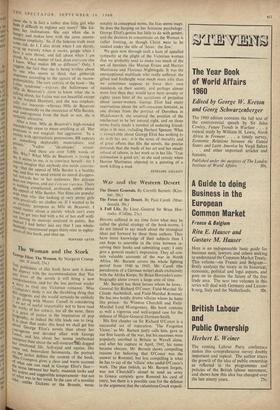P : ublishers of this book have sent it down su, PwaY with
the recommendation that 'For at Y lover of the novels it will bring a new lt 1111 e°stoPrr; to hension, and. for the less partisan reader „s rival any Victorian romance.' Miss -ittr,°Mpton's study is not the throbbing thing that tn's suggests, and she would certainly be unlikely g° along with Messrs. Cassell in considering an act of useful impartiality not to have read in▪ e works of her subject; but all the same, there i; a grain of justice in the imputation of pop i:°:graPhy, as indeed the title leads one to twig. ab
c, is out clear that under this head we shall get less .courageoGeorge Eliot's novels than about her L us and devoted affair with George
es, and less about her serene intellectual r,esources than about the self-mistrustIlet dogged "ler emotional life. Soft-eyed and equine, like rine sad, benevolent Savonarola, the portrait the jacket defines the content of the book; :▪ Ifiss Crompton gives a clear and warm account the 'at one can read in George Eliot's face— her stress between her burly, mannish looks and ardent
" and suggestible temperament—but not w$,What was in her mind. In the case of a novelist °°, unlike Dickens or the BrontEs, wrote notably in conceptual terms, the bias seems inapt. So does the harping on her feminine psychology. George Eliot's genius has little to do with gender, and the decision to concentrate on the Woman is rather limiting, as though Christ were to be studied under the title of 'Jesus: the Jew.'
We gaze now through such a haze of appalled sympathy at the plight of the Victorian woman that we probably tend to make too much of the sex of heroines like Marian Evans and Harriet Martineau and Florence Nightingale. It was the unexceptional multitude who really suffered; the gifted and forthright were much more able than we sometimes suppose to force their own standards on their society, and perhaps almost more free than they would have been seventy or eighty years later of the accretions of prejudice about career-women. George Eliot had many reservations about the self-conscious feminist, as one divines from the portrait of Dorothea in Mk/Nen:arch; she assumed the position of the• intellectual to be her natural right, and on those terms freely made a number of enduring friend- ships w:th men, including Herbert Spencer. What remarkable about George Eliot has nothing to do with her sex : it is the sense of morality and of great affairs that fills the novels, the precise demands that she made of her art and her steady refusal of taboos, in her work as in her life. 'True d2lincation is good art,' as she said crossly when Harriet Martineau objected to a painting of a stork killing a toad.
PENELOPE GILLIATT


































 Previous page
Previous page